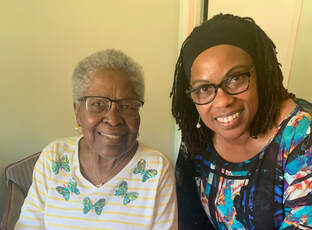 Lois Carson (L) photo credit: Dr. Jennifer Tilton Lois Carson (L) photo credit: Dr. Jennifer Tilton Netflix has a 2021 documentary, In Our Mothers’ Garden, where black women share stories about their mothers’ lives. The daughters admire their mothers’ strength, and sometimes they break down under the awe and burden of not knowing their mothers’ secrets. Daughters want to understand how their mothers learned to carry their disappointments and sorrows. They acknowledge that some of the distance in the relationship was created because the mothers did not want their daughters to ever know the same disappointments and sorrows. But these daughters have lived some life now and have encountered their own joys and heartaches. This seems to only have served to deepen the well of empathy in that mother-daughter connection. Accomplished in their own right, these daughters have a pride in, respect for, and appreciation of their mothers. But then there is a hint of regret in not knowing their mothers in their fullness. There is a distance between them that seems to be unbridgeable. There are missing pieces longing to be filled with “the rest of the story”. Some of our understanding of who our mothers are comes from the bonds of friendship that we saw them make or break and the organizations they worked in or fled from. It is in the communal experience, sometimes generations in the making, that shaped who our mothers were and are and consequently who we are and how we navigate the world. My mother, Betty Harden, died in 2016. She lived 90 years - and no matter how long one’s mother lives – it is never long enough. She has life stories she shared with me that I wasn’t able to understand; she made decisions that baffled me. Just as mothers want the best for their daughters – daughters want the best for their mothers. When she died, like the women in the documentary, I had unanswered questions. Coming from a closed adoption and small family – there was no one to help fill in the gaps. I began writing about that desire to know her and began piecing together my youth in San Bernardino and realized that my hometown helped shape and inform my mother and my life. In Bridges that Carried Us Over - with each interview that I have either watched or participated in - I learn more about my mother. Sometimes it is the mention of a familiar name I hear spoken - Lois Carson, Francis Grice, Jean Peacock - or words of wisdom that I hear echoed or new visions of understanding of what to value and how to value it. I have begun to feel more and more rooted as I learn about the history of the Black residents of San Bernardino, It has been an unusual and unexpected awakening and source of pride: in learning about The Saville family, one of the first families on The Valley Truck Farm in 1927 to learning how neighbors who went to hear Dr. Martin Luther King Jr, deliver a speech inspired marches in San Bernardino. NCNW is a thriving organization and learning about the roots of NCNW and Mary McLeod Bethune in San Bernardino is centering. The grit, determination and strategies used to overcome what seemed to be insurmountable obstacles to create Operation Second Chance is a bridge of knowledge to cross and connect us. On a few occasions, I visited St. Paul A.M.E. with my mother; Dorothy Ingram was faithfully there, independent, strong, kind, approachable. I had always admired Dorothy Ingram and I wanted to know more about the story behind her becoming the first black superintendent of schools in California. One of the interviews in The Bridges that Carried Us Over archive filled in some of my questions. I learned that it is the education system that drove many of the civil rights struggles followed by or in conjunction with housing discrimination. This fact also helped illuminate my understanding of a lot of the wild school board meetings and the current political and cultural war being fought in schools today across our country. We fight for the education we believe is best for our children and the future of our nation. There is power in numbers and consistent effort moves money and legislation, for better or worse. These Bridges, these archives, these oral histories, and the maps – are building bridges of understanding across generations. Just the other day, a young high school teacher told me that she wants to change careers, but she wants to do something that would benefit the community where she would make sure that people were being treated fairly. From The Bridges archive I was able to tell her about Jennifer Vaughn-Blakely and her work as a community advocate and suggested that might be something she should look into. One hundred years after the Black Wall Street Massacre, mainstream news began to tell the story that until the "anniversary" had been covered up and denied. Many, maybe even most, public high school teachers knew nothing about the wealth and success of Black people in Tulsa Oklahoma and the vicious atrocity. It crushed a thriving community and worse, generations of black people did not have that wealth of self-perception to draw on. An NPR story On Fire in Little Africa – FILA talks about “taking the mentality of Black Wall Street and pushing it to the future”. This is my hope for San Bernardino. In 1977 we earned the title All-American City and Black people were instrumental in creating that greatness. I am so grateful to Wilmer Amina Carter and her late husband Ratibu Jacocks for having the foresight to start the oral history video archives. It is an endeavor that will hopefully breathe new life into our self-perception and push the All-American City mentality and what we do into our future.
2 Comments
|
Categories
All
Archives |
RW © 2024

 RSS Feed
RSS Feed